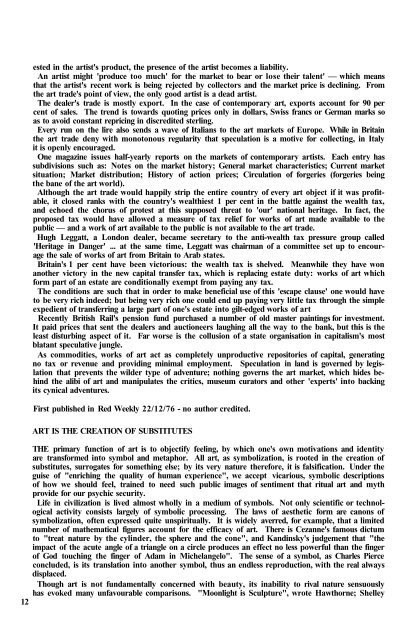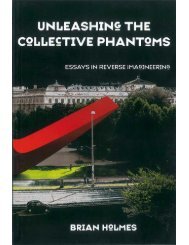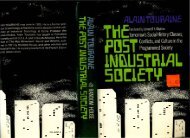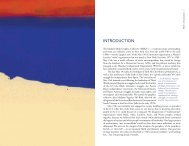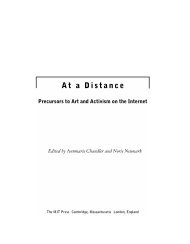Plagiarism: Art As Commodity and Strategies for ... - El plagio literario
Plagiarism: Art As Commodity and Strategies for ... - El plagio literario
Plagiarism: Art As Commodity and Strategies for ... - El plagio literario
Create successful ePaper yourself
Turn your PDF publications into a flip-book with our unique Google optimized e-Paper software.
ested in the artist's product, the presence of the artist becomes a liability.<br />
An artist might 'produce too much' <strong>for</strong> the market to bear or lose their talent' — which means<br />
that the artist's recent work is being rejected by collectors <strong>and</strong> the market price is declining. From<br />
the art trade's point of view, the only good artist is a dead artist.<br />
The dealer's trade is mostly export. In the case of contemporary art, exports account <strong>for</strong> 90 per<br />
cent of sales. The trend is towards quoting prices only in dollars, Swiss francs or German marks so<br />
as to avoid constant repricing in discredited sterling.<br />
Every run on the lire also sends a wave of Italians to the art markets of Europe. While in Britain<br />
the art trade deny with monotonous regularity that speculation is a motive <strong>for</strong> collecting, in Italy<br />
it is openly encouraged.<br />
One magazine issues half-yearly reports on the markets of contemporary artists. Each entry has<br />
subdivisions such as: Notes on the market history; General market characteristics; Current market<br />
situation; Market distribution; History of action prices; Circulation of <strong>for</strong>geries (<strong>for</strong>geries being<br />
the bane of the art world).<br />
Although the art trade would happily strip the entire country of every art object if it was profitable,<br />
it closed ranks with the country's wealthiest 1 per cent in the battle against the wealth tax,<br />
<strong>and</strong> echoed the chorus of protest at this supposed threat to 'our' national heritage. In fact, the<br />
proposed tax would have allowed a measure of tax relief <strong>for</strong> works of art made available to the<br />
public — <strong>and</strong> a work of art available to the public is not available to the art trade.<br />
Hugh Leggatt, a London dealer, became secretary to the anti-wealth tax pressure group called<br />
'Heritage in Danger' ... at the same time, Leggatt was chairman of a committee set up to encourage<br />
the sale of works of art from Britain to Arab states.<br />
Britain's 1 per cent have been victorious: the wealth tax is shelved. Meanwhile they have won<br />
another victory in the new capital transfer tax, which is replacing estate duty: works of art which<br />
<strong>for</strong>m part of an estate are conditionally exempt from paying any tax.<br />
The conditions are such that in order to make beneficial use of this 'escape clause' one would have<br />
to be very rich indeed; but being very rich one could end up paying very little tax through the simple<br />
expedient of transferring a large part of one's estate into gilt-edged works of art<br />
Recently British Rail's pension fund purchased a number of old master paintings <strong>for</strong> investment.<br />
It paid prices that sent the dealers <strong>and</strong> auctioneers laughing all the way to the bank, but this is the<br />
least disturbing aspect of it. Far worse is the collusion of a state organisation in capitalism's most<br />
blatant speculative jungle.<br />
<strong>As</strong> commodities, works of art act as completely unproductive repositories of capital, generating<br />
no tax or revenue <strong>and</strong> providing minimal employment. Speculation in l<strong>and</strong> is governed by legislation<br />
that prevents the wilder type of adventure; nothing governs the art market, which hides behind<br />
the alibi of art <strong>and</strong> manipulates the critics, museum curators <strong>and</strong> other 'experts' into backing<br />
its cynical adventures.<br />
First published in Red Weekly 22/12/76 - no author credited.<br />
ART IS THE CREATION OF SUBSTITUTES<br />
THE primary function of art is to objectify feeling, by which one's own motivations <strong>and</strong> identity<br />
are trans<strong>for</strong>med into symbol <strong>and</strong> metaphor. All art, as symbolization, is rooted in the creation of<br />
substitutes, surrogates <strong>for</strong> something else; by its very nature there<strong>for</strong>e, it is falsification. Under the<br />
guise of "enriching the quality of human experience", we accept vicarious, symbolic descriptions<br />
of how we should feel, trained to need such public images of sentiment that ritual art <strong>and</strong> myth<br />
provide <strong>for</strong> our psychic security.<br />
Life in civilization is lived almost wholly in a medium of symbols. Not only scientific or technological<br />
activity consists largely of symbolic processing. The laws of aesthetic <strong>for</strong>m are canons of<br />
symbolization, often expressed quite unspiritually. It is widely averred, <strong>for</strong> example, that a limited<br />
number of mathematical figures account <strong>for</strong> the efficacy of art. There is Cezanne's famous dictum<br />
to "treat nature by the cylinder, the sphere <strong>and</strong> the cone", <strong>and</strong> K<strong>and</strong>insky's judgement that "the<br />
impact of the acute angle of a triangle on a circle produces an effect no less powerful than the finger<br />
of God touching the finger of Adam in Michelangelo". The sense of a symbol, as Charles Pierce<br />
concluded, is its translation into another symbol, thus an endless reproduction, with the real always<br />
displaced.<br />
Though art is not fundamentally concerned with beauty, its inability to rival nature sensuously<br />
has evoked many unfavourable comparisons. "Moonlight is Sculpture", wrote Hawthorne; Shelley<br />
12


